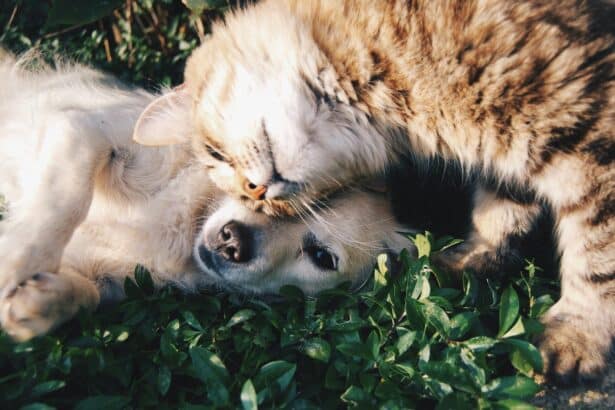Understanding feline communication
Cats have their own way of communicating. Unlike dogs, who readily show their feelings, cats use more subtle signals to make their feelings understood. These signals can be vocalizations, body movements and specific behaviors such as biting.
Cats’ vocalizations can vary in type, tone and volume. For example, a cat may meow to express hunger, frustration, pain or boredom. What’s more, some cats vocalize more often than others. To find out more about interpreting a cat’s meows, read our detailed article here.
A cat’s body movements can also indicate its feelings and intentions. For example, a tail-wagging cat may be hunting or playing, while a cat with a round back and bristly hair is probably frightened or aggressive. What’s more, biting is a form of feline communication that can have several meanings, which will be discussed in greater detail later in this article.
Reasons why a cat might bite you
There are many reasons why a cat might bite a person. The significance of the bite varies according to the context in which it occurs and the animal’s personality.
Firstly, a cat can bite when playing. Cats are natural predators and play is a way for them to practice their hunting skills. So when you’re playing with your cat, it can sometimes forget to hold back its bite. That’s why we recommend choosing games that don’t put your hands or feet in direct contact with the cat.
Secondly, a cat may bite when it feels frightened, threatened or aggressive. If your cat suddenly bites for no apparent reason, this may indicate that she feels uncomfortable in a particular situation. In this case, it’s important to remove the cat from the stressful situation and give it a safe place to calm down.
Thirdly, some cats bite to express affection or to attract attention. This bite is generally gentle and not intended to hurt. If your cat bites you gently and then licks you, it’s probably an affectionate bite.
It’s also possible that your cat is biting you because it has health problems. Cats are by nature very reserved animals and may bite to express their discomfort if something is wrong. If your cat suddenly starts biting excessively, it’s advisable to consult a vet to rule out any medical cause.
How to react and prevent cat bites
The best way to react when your cat bites you depends on the context in which the bite occurs. If your cat bites during play, it’s probably because he’s too excited and hasn’t learned to hold back his bite. In this case, you can stop the game immediately and ignore the chat for a few minutes. This will show him that biting doesn’t bring positive results.
If your cat bites in response to a stressful situation, the best thing to do is to give her a safe place to calm down. Don’t try to handle the cat if it’s frightened or stressed, as this could provoke an attack. Instead, give him space and time to calm down.
If your cat continues to bite despite your best efforts, it’s advisable to consult an animal behavior professional. A behaviorist can help you understand the cause of the bite and propose solutions to modify the behavior. We have an article on our blog that tells you more about how to train a cat.
How a better understanding can strengthen your relationship with your cat
Understanding why your cat bites not only helps you avoid unnecessary injury, but also strengthens the bond between you and your pet. By understanding your cat’s needs and feelings, you can better respond to its behaviors and create a safer, happier environment for both of you.
Good communication is the key to any relationship, including the one you have with your cat. The more you understand how your cat communicates, the more you can respond appropriately to its behaviors. It’s also important to respect your cat’s limits and never force him to interact if he doesn’t want to. For more information on cat adoption and education, you can visit our cat adoption and education portal by clicking here.
Adapt your behavior and improve your cohabitation with your cat
In conclusion, understanding why your cat bites you is the first step to resolving this behavior. By carefully studying your cat’s actions and adapting your response, you can improve your relationship with him and make cohabitation much more pleasant.
It’s essential to understand that every cat is an individual with its own personality and peculiarities. What works for one cat may not work for another. If you’re having trouble understanding your cat’s behavior or solving behavioral problems, don’t hesitate to call in a professional animal behaviorist. They have the expertise to help you navigate the complexities of the feline world.






